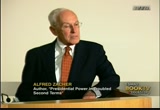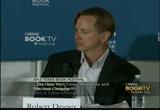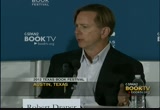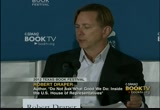tv Book TV CSPAN November 24, 2012 8:45am-9:30am EST
8:45 am
and this was over the years in both the republican and democratic party, governors. one who's now a senator from virginia who had great depth of character, who had self-confidence in a quiet sort of way that could have made them excellent presidents. but they chose not to -- they were not able to win in the primaries. and that's one thing, you could ask whether primaries are better than the old smoke-filled room. i'm not equal to that. [laughter] but that is, that's another topic, another question, another paper. any other questions? uh-huh. well, thank you very much. [applause] [inaudible conversations]
8:46 am
>> we'd like to hear from you. tweet us your feedback, twitter.com/booktv. >> now on booktv, from the 17th annual texas book festival many austin, texas, robert draper discusses his book titled "do not ask what good we do: inside the u.s. house of representatives." this is about 45 minutes. >> good afternoon. i'm evan smith, i'm the ceo andy editor-in-chief of the texas tribune. i am pleased to be here with myt old buddy, robert draper, av veteran magazine writer and author whose latest book is "doy not ask what good we do." robert is a familiar face around these parts having spent thei meaty, early part of his career as one of texas monthly'sil marquee writers, in fact, us being up here together again ise kind of like dean martin and jerry lewis back on stage.rkey [laughter] eing a bit together
8:47 am
again is kind of like dean martin and jerry lewis back on stage. he is currently a contributing writer to the new york times magazine and national geographic and a correspondent for gq. his previous books include dead certain and critically acclaimed biography of george w. bush, a comprehensive history of rolling stone magazine, and a novel, hadrian's walls. a native of houston and its and the university of texas at austin. please join me in welcoming robert draper. [applause] nice to see you. >> nice to be here. >> adelle we my star brought. we better off than we were two years ago? [laughter] >> i really don't have to answer that question. >> you have to answer that question. >> is a need answering? >> it does. >> i think that the unit of measurement that democrats would use for the performance of congress is different from that was the republicans would use. as the speaker has said over and over, the fact that we have passed a record low number of bills speaks well of this
8:48 am
congress, the we are not imposing new regulations, not increasing taxes, and that is one way of looking at it. i think that the way, however, that most people get it attested to by its record low popularity approval rating is that this is a congress that has been defined by dysfunction and gridlock, a congress in which half a loaf has never been better than an and were compromises release seemed to be, you know, of foreign policy, meaning a policy for into the world's great deliberative body. >> do you actually think that the people iran in 2010 and got elected or for that matter the people iran before and have now ascended to positions believe that no is a solution or that they were elected to not do things as opposed to do things? >> well, again, from the class of 2010 and now i refer to the 87 freshmen, the so-called deep party class of the 100th of congress, i think their belief
8:49 am
is that they are doing precisely what the people who elected them with some do which was several back all obama initiatives, to cut spending, a lot of them doubt that the debt ceiling should not be increased under any circumstances, and to that degree they feel like that was a failure. but, no, they basically believe that their job is first to obstruct barack obama and then once there is a republican president in place to pass those initiatives that create a better business climate, more and more deregulation, the funding of programs that have never quite been near and dear to them. yes. i think that they do believe. and, of course, after you flash toward a bit, i expect to will talks about the debt ceiling fiasco of 2011, but after that summer when we were taken to the brink of fiscal clef, we are about to see again, the thinking on the part of the house republican leaders was, well, you know, maybe your tea party freshmen will go home, he yelled at by their constituents and
8:50 am
realized in the you know, maybe compromise is not such a bad thing. the opposite occurred. they went home and the people who go to their town halls tend to be the activists of their party. most people tend to be tea party. there were the ones screaming saying, why did you exit the -- why did you accept the deal. so at best there have been mixed messages, and i think a great likelihood, it will be awhile before we see moderation. >> is this a case where the leaders look at the freshman, many of them soon to be a second term members of congress and they think of bork, if only we could control them is it the case that they feel it is itself out of sync with those who wish to obstruct? or are they secretly happy that the freshmen are getting the blame where the credit for doing the dirty work of the public political would not be able to do. >> they are happy that they are leaders, happy with their power.
8:51 am
i suspect they wake up screaming from time to time because they don't have control over their caucus. and i refer to the speaker, the majority leader, the majority whip. you know, it is not for this class of 87 freshmen, the class of 2010, he would be minority the -- minority leader, but these guys came in not be all my any means to leaders and made it very clear from the outset that they were not just going to be told to fall into line. the real problem for not only this republican leaders, but the case when if ever the democrats regain power is that the enforcement tools of yesteryear are indeed of yesteryear cents in march have now been damned. sense with the blog-a-beer, you concerned tom -- turn somebody into an instant mortar. it is very, very hard to use a stick in addition. there is a point in my book that
8:52 am
i referred to after the debt ceiling fiasco of the summer of 2011 when they came back and yet another continuing resolution used to fund the governments, the obama administration had not passed a budget was coming up. the republicans, the republican leaders believe it was an easy vote, and their own members voted against it. and the appropriations committee , which designs these continuing resolutions and all other spending bills was serious and they insisted on meeting with the. they said, you need to punish these members. we are the ones being punished. were doing everything you want us to do, cutting spending, and these guys still one vote for it. any to fall in line. and he said family can't do that anymore. it will make mars of the. >> so they don't feel like they're in a position to lead on matters of the debt ceiling or anything else. >> in fact, i think it is interesting. this fall but has been devoted to a the debt ceiling.
8:53 am
specifically, you know, long magazine stories to the so-called grand bargain between the speaker and obama that fell apart. from my standpoint all of that is when and sales, with all due respect to the authors of those stories and books because the bottom line is that the speaker never had the votes anyway. whatever deal he would instruct with the obama administration would almost certainly have failed. he would not have been able to get sufficient votes or he would have relied so heavily on democratic votes to do so that he would -- that he ran the risk of an insurrection. in fact, and this is detailed in my book. there was a meeting during the summer shutdown of the debt ceiling in which some of his closest allies met in the speaker's office and said to him, you know, if you come back with the deal, that you fashion with obama that does not give more than 100 votes or so of the republicans, cantor has already started a whisper campaign against you, and you are going
8:54 am
to be, you know, we saw it happen with the speaker gingrich, and it can happen to you. he took that to heart and walked away from the deal shortly after that. >> i want to come to the interplay between the leaders of the republican side, but i have to ask this based on what you said. you may know, i think you know that the president was initially given off the record interview did and one editorial board seeking and did not get the endorsement of the paper. one of the things he said in an interview was that he believed he could get a grand bargain struck on the debt ceiling if he were reelected on november the sixth. based on what you're saying, it may not be possible if the freshmen, now sophomores and some of the new members to comment don't essentially given their blessing to go cut a deal. he may feel in the same tough spot now that he was last year. to a grand bargain ultimately based on what you're saying may not be possible if he wins under any circumstance. >> in this is taking have this right outside of the book, but
8:55 am
go ahead and take it anyway because i been doing general election reporting for the new york times magazine. do know, in talking to the campaign manager of the obama campaign, david axelrod, ron emmanuel, stephanie cotter, and asking them, how would the next four years under an obama presidency given that the house composition be more or less the same. >> almost certainly going to be similar. >> how will things be different? uniformly they're answer, in other words, this is a talking point was that the fever will break. that the american people, if they vote for president obama for another four years will basically be voting against obstructionism. the republicans will get the message and they will walk, you know, i'll be it in a consultative fashion toward the center. >> to you by that? i can see that happening and all >> no. as the talking point in a sticking with it, but -- >> are you any more optimistic.
8:56 am
as a romney were to win as opposed to the president reelected, some dealers waiting for him after he gets into office. >> no. no, i'm not. and, you know, i wrote a story for the new york times magazine when governor romney, specifically on his time as governor that appeared about three weeks ago. and, you know, the way the piece includes is by -- i interviewed a number of people, particularly the more conservative house republicans. there licking their chops. they believe that this will be a great moment for them if mitt romney wins. a moment for them the legislate very aggressively the conservative agenda. my question to several of them was, but what if that is not so? what if governor romney, president of electronic decides that that is not how he wishes to govern and will govern more in his motion when he was governor of massachusetts and
8:57 am
the uniformly said there would be disappointed. and one of the stars of the two-party freshman class is featured in my bug said there will be an insurrection. really boisterous. you have seen nothing yet. president romney does not behave like the conservative, it is going to be the death of the republican party, but we're going to burn down. >> i'm going to let that sit there for a second, let that sink right in. and i'm going to ask the next question. let's come back. i want to ask you about specifically as individuals and as a threesome the way they do or do not work well together. characterize each one in shorthand beginning with the speaker. >> well, a washington lifer and thus was not the obvious choice to be leading this tea party class. nonetheless, he could see the tea party phenomenon for the freight train that it was an elected to be on the train rather than to be underneath it.
8:58 am
and so, you know, the speaker campaigned heavily for a number of the two-party freshman, and he also, you know, believe that is presented the republicans and indeed america with a great opportunity. his belief, for example, was that this would be a perfect recipe for entitlement reform. he wanted, if you're going after in selma reform, you want ideally to have, you know, bipartisanship and pieces of the democratic presidents of the they could not walk away from it. and so he believe that he could leverage, you know, the deep conservatism of the two-party into action, but he has failed to do so. and the tea party freshmen with whom i spent a great deal of time, and i have spent time with an awful lot of them, you know, like him personally, found an admirable in the way of a genial ceo, but certainly not as their
8:59 am
real leader. and that has been implicitly to clear throughout the hundreds of congress. now, the majority leader, a bit different, somewhat younger, very, very, very clever guy. he has his own back channels and the obama white house with by -- vice-president biden. they found that they meet each other as information sources. i believe it was biden, this would not surprise any of you, that was leaking to eric cantor that the speaker was pursuing separate talks with obama during the so-called biden talks of which eric cantor was a part. this may cantor livid. he ultimately walked out of the stocks of mostly because of a the dynamic going on with banner, the of the excuse he gave was that he heard that the democrats to blow this up. as this sounds i'll this to you? >> well, the question i'm going
9:00 am
to ask is probably childish. if you walked past the speaker's meaning an open window he would not hesitate to push him. >> actually, they have learned, for one thing, the speaker is a very even tempered man. the less the moment is absolutely right you tend not to be able to get ahead by declaring a mutiny. >> so there is a detente in essence between banner and cantor. >> yes. now, interestingly, working more or less in the middle is the majority whip, kevin mccarthy. mccarthy has been -- he has only been in for three terms, and so in a lot of ways he is practically a freshman at self. he recruited a number of freshmen and became, and away, the big brother to them. it was a very clever move on his part because the freshmen, this block of 87, and many times they have behaved like a block, have been the straw that has stirred the drink of the hundredth of congress. and so off to the extent that anybody knows their weapons, the sentiments, it is kevin mccarthy
9:01 am
. mccarthy and kantor are very close. there are two and the troika of the young guns. and they sort of represents a huge movement. there are a lot of people in the speaker's world you don't trust mccarthy because of his, because for one thing he is probably ambitious but also because he is very close to cantor. having said all that, this is the kind of thing washingtonians work themselves up into a frenzy over. the reality is, there is not day-to-day parlor in street. more often than not these guys work in lockstep, but certainly there have been moments that the debt ceiling stand up being one of them, when you could see separate damage taking place between kantor and the speaker that have been both looking over their shoulders. >> you mentioned paul ryan. of course i cannot go on without asking about him and the role that he has played in this congress and the degree to which his celebrity is embraced by
9:02 am
other republicans who are presumably, as you say, as ambitious as the. he is the one who kind of got out. he is the one who rose above the others to be plucked as mitt romney's running mate. is everybody in the republican leaders have for that matter the republican ranks happy to see in there? is the resentment of him? to their respective as much as they are said to for his brain and his facility with numbers? >> they do respect him, and i think that there are those -- the people who resent and distressed paul ryan in the republican party are the members of the so-called tuesday group, which is the group, the waiting in member group of moderate republicans in the hand. they resented the imposition, the so-called ryan budget as the republican house budget. that budget, by the way, and brian's budget pancaking around for several years when he was the ranking member of the house budget committee back when policy in the democrats were in
9:03 am
power. he would introduce that budget as the minority budget. and 20-25 percent of republicans routinely voted against it. yet when the tea party wave came in and when the republicans retook the house and now ryan was chairman of the house budget committee, he -- ryan was very, very clever to for one thing develop a consensus among all these think tanks, among the leaders as well. and the small number of moderates were drowned out, and ultimately that then passed with only four republicans voting against it, which was an astonishing kind of consensus. now, rain is widely admired and mocks the freshman class, very clever guy because i think that as my friend, the new york times magazine and wrote in his piece recently, ryan is one of those guys who has pulled off the feat of being a politician. he makes you feel like he is about politics and he is not about politics.
9:04 am
in fact, he is practicing his own brand of politics, very cunning brand. >> should they lose on november 6th and congressman ryan presumably gets reelected running down the same day to his seat in wisconsin and returns to the chorus, is that going to be okay with them? and will that be okay with them? or will he with his new-found celebrity possibly displace yes in some sort of role? >> and dad don't think that is the path he is interested in. he really likes being in the house. is that going to be in the white house, being the chair of the house budget committee is actually where the action as command on the democratic side to my chris van allen made a movement away from the so-called track to be the counterpart basically because he knew that was a high-profile assignment. >> you mentioned the democrats, which reminds me they're still there. you can be forgiven for thinking that there aren't any. we have not talked about any for
9:05 am
the prospect of the democrats getting back into the majority. we don't think that will happen. how is nancy pelosi regarded? i have asked about the others. she was speaker. she is now leader. i guess it was not a given that she would be minority leader after they lost the majority, but she is still in control, and as i seem to be any insurrection of the democratic side to try to change the dynamic. >> there will not be any kind of insurrection. it has been interesting to see. i interviewed the minority leader for this book and talked to lots of other people in the democratic side of. in following a round the republican freshmen it was interesting to see these guys involved. one reason why i wanted to do this book, but one thing that did evolves and many things that did not, but one thing that it is their opinion of policy. decanters specter. she holds her caucus together, and it is much more diverse than the republican. and she can count, as they say,
9:06 am
better than anyone in washington, specifically 218, which is the number it takes to get a majority to pass a bill on the house. chicken count the number that it takes her to become house minority leader. indeed, after she lost the speakership and one of the dwindling number of blue dog democrats decided to run against her. i mean, she made it very clear very quickly that she had the votes on them. and a lot of people who had she not move so quickly might have supported shuler realized it was not a good idea to be in a losing cause and to be sort of out there. she is a very, very formidable person. obviously what she also is is the face of the democratic house and the democrats at large, and that has not been a good thing. after the democrats lost in 2010 there is a meeting that i detail to my democratic caucus in which policy called a closed-door, none of the staffers were present. and policy said, but i would
9:07 am
like is just for the people who are defeated this election, would like for this to be their opportunities event whenever they're would like to vent. the line, in fact was very long. a lot of democrats lost a man some of them said the loss because of obamacare and were glad to fall in their spare for that. others said that they blamed no one, that it was just the nature of an unpopular president had tracked him down, but several of them, particularly the blue dog democrats in these moderate or swing districts stood up and said, you know, speaker, i have a lot of respect for you, but you have become the face of our defeat. tear no fault of mine i campaigned as a moderate congressman i governed as a moderate congressman, but when it came for a campaign against me in 2010, all they did was run ads, a picture of you and a picture of me as if we were best buts. and if i had run again against the guy who just beat me they're going to do that again. that is their playbook, and it
9:08 am
is a successful one. so she has been a -- fire policy was -- above the republican national committee there was a big banner. after the big tsunami hit, the tea party wave and the republicans took power, and it took the sign down and put higher policy. >> so leader policy or the president more problematic for the democrats today in terms of their desire to regain the majority in the house? >> well, i think that is maybe a distinction that is meaningless. there both problematic, and you don't find a lot of democrats except in liberal districts that would not the barack obama's up anyway, campaigning with the president. they use, you know, the obama apparatus and the policy apparatus for fund-raising. that is about it. there was a drive to 25, that is how many seats are necessary for democrats to flip and regain power. and there appeared to be a moment's time when, particularly
9:09 am
after this woman one in upstate new york taking the seat on medicare platform basically. and it looks like that was going to be the winning argument, to simply to say that the republicans we will end the medicare guaranteed, but now that does not seem sufficiently potent to get them the majority. >> i want to take the moderator at the texas book festival prerogative and ask you about one particular texas congressman who you write about in this book. one of those freshmen elected 2010 from corpus christi. a very instead to die. if you pay attention to the congressional delegation he certainly is more interesting and more fun to write about and more fun to cover the others. why did you pick on them? and why did you take him to write about? and would you talk about him for this group? >> many of you are texans know the name, but noted in a different context. his grandmother is a liberal
9:10 am
icon. did not give his politics from his grandmother. an entrepreneur, and somewhat of an accidental congressman. he ran in 2010 as the texas congressional district that includes corpus christi, and at the time it included rumsfeld. district, in other words, that was 70 percent hispanic. blake himself spoke no spanish. he was a political unknown. however, in 2010, despite the numbers seemingly being overwhelmingly against him, it being a midterm year, a lot of latino voters stayed home, and there was a big tea party movements in the corpus area, and he won after a runoff by about 800 or 900 votes. >> cb solomon of -- solomon ortiz senior. >> that's exactly right. yes. but he arrived because first he was inexperienced in the ways of governance or politics at large. he arrives three and half weeks after everybody else did because
9:11 am
of the recount, and so i followed a lot of these congressman around to get a sense of the irrational experience, and his was one of the kind of citizen politicians to try as you might can never quite catch up. always just sort of, you know, holding on to the medicine ball for dear life and never kind of getting a top of it. he was -- i mean, he told me he had this recurring nightmare that he was alone in his office and there was no furniture and only a phone that rang and rang and rang and he was never able to get it. he told a group of business lobbyists. you know you have that anxiety. dreams are really big. you know, that anxiety dream of going to school and looking down and not wearing your pants. you need to be the guys to tell me where my pants. the ones to tell me what things they ought to be voting for. and, you know, remember him
9:12 am
saying very early, he was trying to apply his business acumen to the model of politics. he said in a you know law, legislative director seems like a part-time job to make. and what that meant was during the first continuing resolution, there was this sort of orgy of everybody, of very open and kind of glorious process, if a messy one, he did not understand what any of the more because he had no legislative director to explain to him. he did not have a full documentation director because he had been a radio disc jockey. he believed he committed 12. he did not have a congressional website because he said own a computer business. he knew that to do -- to put up the website it only cost next number of dollars, and there are i think only five companies in washington d.c. that have been deemed to secure some debate on that contract, and he found that the prices they were charging more egregious, that back in corpus the cost a lot less, and
9:13 am
so did not put up a site for a while. so it became a lot of voices of worst enemy on top of which his wife, it was often the case, congressman that became very, very interested in the personal, very interested and lots of things which in turn cause great personal turnovers. and so in addition to that he was elected on at the party wave. after he duly elected he realizes he is the congressman of the distich that is 70 percent hispanic. a solution to this problem called redistricting. that is what happened to him, but in the meantime he would have these town hall meeting something that a lot of latinos will show up. he would get to no them, hear what their concerns work. when he would talk to them about the need to compromise, they would stand up. i attended some of these. these tea party guys would stand up and say we did not send you to washington to compromise. so he was caught betwixt and between. >> before we opened up for questions i have to say, who in
9:14 am
god's name would want to do this? makes serving in congress sound so unattractive. why would anybody -- we say, well, we have done a great public service. we don't give people a reason to run. you have for a half-hour giving young people every reason to do anything but. >> book, let me give you the counterpoint, the institutional counterweight as a guy who spent a lot of time, his name is john dingell, a democrat from michigan, 85 years old, and he has been serving since 1955. previous to him, his father served in the same congressional district until his father died and his son then ran and took his place. you know, used to be thought of as a liberal. no one thinks of him as a liberal now, led the democrats don't because they marginalize them. did not find him sufficiently liberal. yet he is sort of proof, and they show it to you, that even
9:15 am
with the democrats in the minority, even with him being removed from the pecking order of power, he is able to get things done. this wily guy knows how to pull strings on behalf of his district and get parts appropriated, to get bills passed. i mean, you pass this pipeline safety bill which is essentially a regulation built during the tea party congress. almost unheard of, and he is, i think, a dying breed. his philosophy is, you govern from the center. you begin writing a bill from the center, which means you bring everybody on board, get in and around the taco with it would like. it sounds pretty reasonable. is not the way it works. choose their idea, you know, the republican leaders, previously the democrats were guilty of the same thing, you know, let's take out our position far to the extreme. make them come all the way in that direction. if we get something toward the center and okay.
9:16 am
let's start there. that's not the way, and unfortunately i think his way is dying. >> the passing of an era. we have time for questions. now about 15 minutes. microphone in the center. we ask that you get up. even though we are amplified, please use your outside voice so that we can hear you. we will take as many as they tell us we can, and when it tell us we can't we will cut you off. >> this is a specific question. given the too big to fail banks are now bigger and more consolidated than ever, and given that the dodd-frank bill reforms regulations have been deleted and postponed and delayed, i am assuming there will be another banking crisis eventually, maybe next year, maybe, you know, whenever. do you think that it is another bill that comes up to bailout the financial industry wall street, the banks got to you think that the tea party and the house would go along with that?
9:17 am
do you think that they would stop it? >> no is the answer. i think that it is still a dirty word. particularly in conservative circles. roy blunt, for example, now senator in missouri helped put it together. he has, you know, the conservative flank of his party that has never forgiven him for that. i think that the point of view whether it is factually borne out and not is that that sort of deal, anything that basically causes more regulation in the banks, creates more problems than solves. and that is -- and speaking of the house republicans. and i don't see the composition and the logical speaking of the house republicans changing anytime soon, though it is interesting to see that, you know, in the congress and the house of representatives there are still a lot of people from the very high blood a class of 1994, the newt gingrich revolution, and some of these guys. one of them is now retiring.
9:18 am
he is a member in good standing of the moderate tuesday club, and he is retiring in large part because of his disgust of the tea party. so this is a guy who in a lot of ways was the forerunner of that movement but who mellowed over time. that's one way of looking at it. other is that even the class of 1994 was nowhere near as conservative. >> those dozen liberals by comparison. you think of a bill or something like this comes up to bail out the banks the position will be let the banks go? >> well, i think that the speaker will have a decision to make. he is not going to want there to be a depression on his watch, particularly, of course, have their is a republican administration. there is president romney, romney supported it and supported rather rapidly. in fact, mention in that story that eroded the new york times magazine that in 2008 when the financial crisis, you know, when the bank miltown was upon us and john mccain was decided to
9:19 am
suspend his campaign, his decision to do so came as a result of a meeting he had with his economic advisor team. all of these work big corporate donors. romney was among them. all of those guys basically said take it. take whatever bush is offering. this small town expand. the next day, and facts and romney went on the today show and said, yeah, i support it. that's one thing. he has not modified his support of tart. if they're is a president romney and if there continues difficulties with the banks, then under those circumstances, yes, there could be a recipe for more regulation. >> what impact, if any, do you think that the changes in california and their method for electing congressional representatives will have? >> are you referring to the redistricting? >> yes. democrat versus democrat, republican versus republican in
9:20 am
their system of electing. >> if i am understanding your right, you are referring to -- now there was a kind of bipartisan commission that redesigned -- that did the redistricting. now, i actually did a story for the atlantic monthly on redistricting. i had mentioned this thing. there has been -- the belief by many politicians is that there is no such thing as a bipartisan board are nonpartisan board. they often times point to the california commission as a failed experiment because the democrats had menace to influence a series of e-mails obtained by pro public of which suggest that was the minister and floods a lot of these. having said that there are a number of other states in the u.s. that do have bipartisan redistricting commissions. and just for what it's worth another reason why this is a salient topic is that i am often
9:21 am
asked, if this is, you know, the worst congress ever or if this is not what we wish that congress would be, you know, what would be the solution? and there are not many of them that come to mind. the redistricting reform would certainly be one of them because what happens is that when we create these districts that are so rigidly read or so rigidly blue then we send to washington people who are beholden to the most extreme elements of their party. those people have no incentive whatsoever to compromise, to reach across the aisle. and so as long as we are basically allowing the majority party of any given state said then gerrymandered districts that will favor their party and kneecap the opposition party, then we are perpetuating or really exacerbating, you know, this political divide. i think that that -- the problem, of course is too will pass this bill. you know, there has been a guy named john tanner who was the
9:22 am
head of the blue dog democrats. during his last couple of terms he kept trying to bring it up, during a democratic majority in nancy pelosi would hear nothing of it. she would say, that seems very interesting and would never get scheduled. since then another blue dog democrat had been trying to a did it on for consideration and no dice. so unfortunately, you know, to reform congress talk congress has to the play along. that seems unlikely to happen. >> i guess where i was going was that you have 52 congressman, congressional districts in california. and they have reformed the system. you have, i think, tend to stretch out there now that have republican versus republican or democrat versus democrat. at least one this fight. they have gone after each other. but is forcing them to the center. it would seem like it's doing what you're -- >> well, that's right. and, yes. i mean, i do think that there's
9:23 am
some people have pointed to the california example as being prove that this is a flaw that means of reform, it still strikes me as a and a possible reform. >> the tea party has peaked. may be starting to decline. to use see any evidence to support this claim? is it just wishful thinking. >> wishful thinking. you know, i have heard -- it seems like every month and a half or so there is a new, you know, sort of many movement amongst the large the conservative opinion leaders. they start writing stories, and some democrats as well, about how the tea party movement is dead. the most recent evidence being that it mitt romney was it will be because the move toward the center. i don't think that the tea party movement has ever been proved that we are our great nation.
9:24 am
it is proof that the republican party is tilted right. if from the beach obama then it will be because he has won a lot of independent voters to moved from party the party election to election. to me the best evidence that the tea party movement is not here to stay, at least matured, it has entered the bloodstream is by the behavior, the voting behavior of congress. you see, you know, for example, the ryan budget. you know, both times, in 2011 and 12 when it came up for a vote, all these republicans who previously voted against it now vote for it. the reason for this is that if they fail to vote for it there will be primary by someone who will get to their right. in fact, one of the people that i read about in the buck is a moderate republican named joann emerson and misery. and she voted against a couple of things that, you know, were not -- or firing behavior was not deemed sufficiently right wing. but some things saying hey, here
9:25 am
is what the primary. as of that sort of behavior strikes fear into the arts of a lot of legislators. >> and if governor robin is a response to that from the tea party will be, we still do so. >> yes. and that is where the moderates are already. >> a level of gridlock. what do you see coming down the line considering the judicial point of crisis to back. >> a lot of unfilled vacancies at how this new congress with the current congress will react. >> that is a net. my book is about the house. i think that the problem is this is a different issue that has to do with the ability of a particular senator to block a particular federal. two to the rules and traditions of the senate. the moves to reform that. but the party in power tends to go against those movements, so i don't see there being any change in the behavior a chance in.
9:26 am
>> the reality is we may have a set to the same situation in the congress regardless of the half, the presidency. republican majority house, democratic majority barely in the senate. it could very well happen next time. >> you have already said that tea party types did not like tarp, but the great apocalyptic moment in the too big to fail scenario of 08 is when hank paulson said if this doesn't pass there will be no economy on monday. to you think with the romney or obama as president of another such moment occurred that the tea party types would listen to people like that and still send the economy down the drain? >> well, there is a moment that i memorialize in my book during the debt ceiling standoff that i think is real, you know, illustrative. the thinking of the more conservative flank. and it was the house leaders, you know, i'm answering your
9:27 am
question in a general way because i can speak specifically in the future. but there were concerned. they believe that ceiling needed to be raised. they did believe that risking the full faith and credit of the netting states was a very dangerous proposition. they believe that a default would be a terrible thing for this country, and so because they could see that a lot of there fellow members did not believe that to be the case they brought in this treasury, this former treasury undersecretary named j. paul who served in the george herbert walker bush of ministration to explain to them the very dispassionate ways of what would happen if -- when august 2nd came and went in the debt ceiling was not raised. he sort of did through a power point presentation of what -- when certain social security checks would not go through, al immediately all federal prisons were closed and how, you know, such and such a point veterans benefits would be cut off. and it was very compelling evidence that this would be really calamitous.
9:28 am
yet there were some republicans to set up, house republicans said it's outrageous that you're talking about this instead of washington's reckless spending habits. another guy stood up and said karl rove spoke to us this morning. he had just written an article in the "wall street journal" saying this is obama's problem. you seem like a nice guy. and so they were unwilling to listen to this. the aforementioned matter republican asked one of the tea party freshman. like. have some tea party constituents who insists he should not raise the debt ceiling. can you explain to me what this is about? i don't want to lose my temper to them. and this guy said, well, you know, the thing is we have been reckless and i spending. these are the consequences, so be it. went on to her husband and said poor me a very big glass of wine . >> we have one -- that would be
9:29 am
the perfect place to end. we have one last question before we wrap it up. >> given that you go to a lot of these house of representative meetings, town halls, community meetings, are you hearing more or have you heard people say if you just to this meeting that there is a correlation between doing something and the end results where there are not other factors being considered, are we more simplistic and what we believe can result from taking action? >> the town halls that i went to where republican town halls. and overwhelmingly this sentiment in all of these town hall meetings was a feeling of distrust toward washington, feeling that the public has lost control, feeling that washington has not been acting in their best interest and that, you know, i thinkt
108 Views
IN COLLECTIONS
CSPAN2 Television Archive
Television Archive  Television Archive News Search Service
Television Archive News Search Service 
Uploaded by TV Archive on

 Live Music Archive
Live Music Archive Librivox Free Audio
Librivox Free Audio Metropolitan Museum
Metropolitan Museum Cleveland Museum of Art
Cleveland Museum of Art Internet Arcade
Internet Arcade Console Living Room
Console Living Room Books to Borrow
Books to Borrow Open Library
Open Library TV News
TV News Understanding 9/11
Understanding 9/11











































